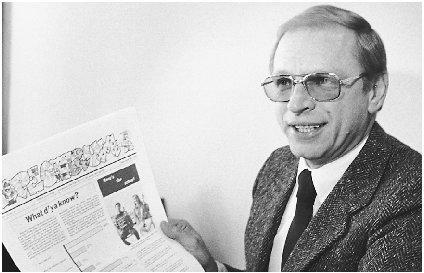
Library of Congress
Robert E. Reynolds is the Missouri high-school principal who, in 1983, deleted from The Spectrum, the student newspaper of Hazelwood East High School, articles he found inappropriate. The students sued. The Supreme Court took the case. The principal won.
Nailing his “95 Theses” to a church door in Wittenberg, Germany was Martin Luther’s first step in his religious revolution. Now known as the Protestant Reformation, Luther’s writing in 1517 sparked both conflict and conversation, and finally change to the Roman Catholic Church. In response to his proclamations, the Church, though they had the power and means to do so, did not take down his writing, did not punish him, and did not force Luther to take back his claims.
Why then, 500 years later, is this the very consequence so many teenage journalists face in their schools?
This year, my school, The Young Women’s Leadership School of Astoria, started a newspaper club. With official policies not yet fully established and a small staff, I took the initiative to promote the first issue of our online newspaper by taping an article I wrote onto a hallway wall. The editorial points out the faults of our student government group and suggests possible reforms which would democratize the organization.
Within a few hours of posting, students crowded around the wall to read the article. A few took pictures to send to their friends. A murmur of discussion began on the validity of school elections and the worth of a teen’s vote, both in schools and in broader politics. Not everyone agreed, of course, but the beauty was that not everyone had to. My classmates were responsible with their free speech and civic-discourse rights.
But even though we were being respectful, my principal tore down the article. She called my parent in for a meeting. Later, the newspaper adviser told me that either she or the principal needed to approve all of editorial decisions for the student newspaper. She said that if the school name was to be put next to the newspaper title, it had to reflect the interests of the school. Even a month after my article was posted, I was not allowed to participate in a school trip to the Broadway show, “Once of This Island”, because I had failed to ‘uphold school values’ through my actions.
Here’s the problem with that: My classmates and I did not join a PR club, we joined a newspaper.
Under the 1988 Supreme Court case Hazelwood School District v. Kuhlmeier, school officials may censor school-sponsored publications that are “reasonably related to a legitimate pedagogical purpose.” The Court’s examples included material that is “ungrammatical, poorly written, vulgar or profane or unsuitable for immature audiences.” My writing was none of these things. And by the adviser insisting she be a part of editorial decisions, she stripped us of our rights to be a “public forum for student expression,” a designation by the courts that gives us First Amendment rights and power to make all of our own editorial decisions.
Initially, my inspiration to put the article on the wall was in response to what I had learned in my AP World History class about Martin Luther. After this meeting with my principal, I was left wondering why Luther’s dissenting voice was successful in not being censored while mine had not.
The Roman Catholic Church was such a powerful institution that it was not threatened by an opposing opinion. Students, on the other hand, are seen as threats to their school’s reputation and image. The power of students has never been so evident as with last month’s March for Our Lives rallies, one of the largest youth rallies since the Vietnam War, according to the tallies recorded from the Crowd Counting Consortium.
Young people are also at the forefront of a free-speech movement in New York State. The student-powered grassroots New Voices movement pushes for state legislation to “make schools and colleges more welcoming places for student voices,” according to its website. One priority of New Voices is the Student Journalist Free Speech Act (S.7721/ A.9801) in New York State. If passed, the bill would give student journalists full editorial control over their publications. It does not promote an “anything goes” ethos. Instead it is built around the same journalistic principles that guide professionals. Fourteen states already have similar laws that give students their rights and many protect their journalism teachers’ jobs at the same time.
The passage of this legislation would allow me and my staff members, along with the rest of New York student journalists, the right to practice democracy and be civically engaged. Undoubtedly, we will make mistakes. But we will learn and get better through our own accord. We cannot become better citizens under an authoritarian regime that strips us of our curiosity, inquiry and pursuit of truth.
Some of the most important journalists in American history have provoked change and awareness through their writing. Upton Sinclair’s “The Jungle,” Jacob Riis’ “How The Other Half Lives,” and Ida Tarbell’s expose on Rockefeller’s oil company were never subject to censorship or punishment simply because what they wrote may have been, for their time, unpleasant or uncomfortable. And more than a century later, that same sense of freedom and expression should continue to resonate and extend to students in their school newspapers with the assistance of legislation like the Student Journalist Free Speech Act.








